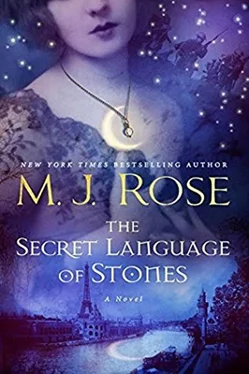The studio’s slanted ceiling was fitted with skylights separated by wooden beams functioning as a design element to section off the big space into stations. As we went from one to the next, the artists stopped what they were doing to explain their process.
“After we meet with the soldiers, we bring them here.” Madame Alouette indicated a small room off the main space with a comfortable chair, several cameras on tripods, and a table with various pencils, paper, and calibration instruments. “In addition to photographing the subjects, we need measurements of their features.”
She opened one of the folders on the table. Inside were four photographs of the same man. The front view showed a missing chunk of his right cheek, a scarred crater where there should have been bone. Then a right profile shot, a left profile shot, and a photo of the back of his head.
Pointing to the red notations I’d noticed on the photos, Madame Alouette said: “In addition to making a plaster mask of the soldier’s face, we also measure everything by hand-the length of his nose, if it’s all there, the distance from ear to ear, the space between the eyes.”
“What a difficult job.”
“Yes. Our measurer is Madame Sisley. She is very gentle and knows how to put the soldiers at ease.”
Next Madame showed me the stations where the models were made. There were twelve in progress. Looking at the heads, each deformed in a terrible way, I shrunk back. The right side of one boy’s face was blown off, and only part of his right ear remained intact. Another was missing his chin. Each immobile white head was mangled in a unique way.
I thought of Timur and couldn’t help wondering if the bomb that killed him had damaged his face too. And what of Madame Alouette’s son? Jean Luc had become such a vivid presence in my mind, and yet I had never even seen a picture of him. If he looked anything like his voice sounded, he must have been handsome. When the end came for him, had he been disfigured, his beauty destroyed?
Following Madame Alouette, we arrived at the station where the masks were painted. Next, she showed me the wall of spectacles, where dozens and dozens of pairs of glasses stared out at me.
“Why are there so many?” I asked. “Does something happen to the soldiers’ eyesight?”
“No, we attach the masks to glasses as an anchor. Sometimes we need to paint an eye onto one of the lenses, other times we just use unmagnified glass. If the soldier has lost his ear, it’s more complicated. There is an elastic that attaches-”
The young woman arrived carrying the tray of coffee. Madame Alouette took it from her and thanked her.
“We can visit in the consultation room, Mademoiselle Duplessi, it’s this way.”
We sat down in a small, comfortable room set up much like a sitting room in someone’s home. There were two couches, a card table with four chairs, a vase of roses on the fireplace mantel, landscape paintings on the walls, and decorative carpets on the floor. Suddenly, it occurred to me there were no mirrors anywhere.
Everything about the studio had been designed with the soldiers in mind. The first part of their journey back to life started here, and clearly great pains had been taken to lessen their anxiety about being stared at and prodded and measured.
“It’s quite a lot to take in the first time you see it, isn’t it?” Madame Alouette asked, as she poured the coffee.
“Yes. It is…” I searched for the word. “It is heartbreaking.”
“Do you take milk?” she asked.
I asked for a little, and she poured it in.
“Sugar?”
We all knew how hard it was during the war to get sugar, and I’d learned to drink my coffee unsweetened. “No, thank you.”
“It is heartbreaking,” she said as she handed me the cup, “but at the same time positive and hopeful. You need to see it that way too or you won’t be able to bear it.” She sounded desperate for me to understand. And I did.
“You give them back dignity.”
“Yes.” She nodded vigorously. “The masks aren’t the same as faces. People still sometimes stare, but with curiosity, not disgust, not horror. The boys can meet women, court them, or go home to their wives and make love to them. They can hold their children, they can get jobs.”
But in the dark, I thought, in the dark they are still wounded.
“Did you bring the charm?” she asked.
I pulled the leather pouch out of my pocketbook and slid it across the table. She reached for it, opened it, and took out the talisman. Letting the silk cord hang from her fingers, she studied the jewel. The crystal egg swung in the soft light, glowing a little with energy.
“How does this work?” she asked.
“You put it on…”
She slipped it over her head.
“And hold it between your hands.” I showed her how to clasp the talisman between her hands as if she were in prayer-not because of religious significance, I explained, but because, enclosed, the talisman contained its energy. “Now, I put my hands over yours,” which I did. “And in a moment or two…” I stopped talking, closed my eyes, and waited.
Normally the scent of apples would overpower me right away. Nausea would follow seconds later along with a terrible pounding in my head. And then, in the midst of the discomfort, the messaging would begin. The dead soldier’s voice would flood into my awareness.
I didn’t expect any of those effects. The hair in the locket wasn’t Jean Luc’s, but rather from the little boy who lived in the Palais upstairs from our shop.
Except, within seconds of putting my hands over Madame Alou-ette’s, the distress began. The scent, the headache, the nausea all descended on me, and the voice was the same one I’d heard at the workshop, in the shelter, and in my bedroom.
But of course, I thought. I’d performed so many sessions, my body anticipated the reactions and delivered them. And I’d manufactured the voice before-why not again?
Often the messages I pulled from the ether contained information too personal for me to understand, but sometimes they were generic enough to be clear even to me. I’d planned on giving Madame Alouette one of the more comprehensible communiqués I’d heard over the years. I knew them all, those sorrowful farewells were lodged in my heart.
But I didn’t require some other soldier’s thoughts; I heard Jean Luc’s.
No pain. Tell her there is no more pain.
“He’s not in pain anymore,” I whispered.
“Jean Luc? Is he here?”
I nodded.
She is worried about the pain because of the accident I had when I was little.
“He knows how much you always worried about him being in pain, since the accident when he was a little boy, and he wants you to know he’s not in pain anymore and you can stop worrying.”
I could see it in Madame Alouette’s eyes, in the set of her mouth. She would never stop mourning her son, she would never miss him less, but with just that one sentence, she gave up her fear. Silent tears fell in silvery tracks down her smooth cheeks as she smiled. Even though I’d witnessed similar transformations before, they always stunned me. How little and at the same time how much it takes to give succor.
“He grew so fast, he was always too thin and so always cold. He gravitated to warmth, playing too close to the fireplace, despite my warnings. One day an ember sparked and flew out. Jean Luc didn’t understand-he was only about four-he just felt its warmth and thought it was a toy-and so picked it up and put it on his palm. He only suffered minor damage to his fingertips, but his palm was severely burned and he was in pain, terrible pain, for days…” She paused. “Do you have children?” she asked.
“I don’t, no,” I answered, astonished at the coincidence. I already associated Jean Luc with warmth and fire, and fire and warmth were the nucleus of the story his mother had recounted.
Читать дальше












